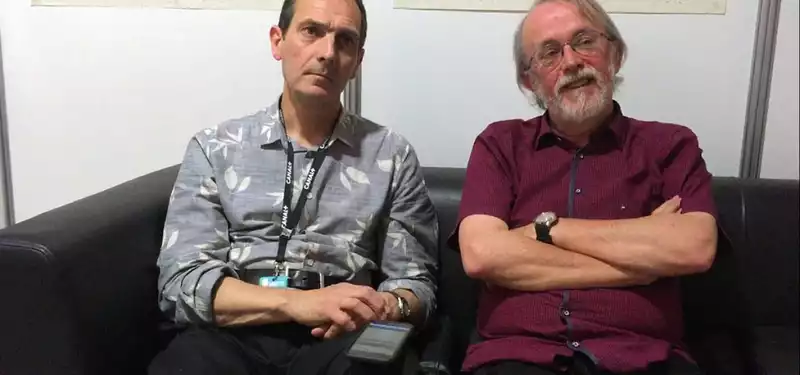Jun 17, 2016
Peter Lord and David Sproxton look back at Aardman's 40th anniversary
“We like being independent and we're not in it for the money,” Aardman co-founder Peter Lord (above, right) told Cartoon Brew at the Annecy International Animation Film Festival.
This is a sentiment you'll often hear from independent filmmakers and small studio proprietors, but it's far more rare to hear it from the owner of one of the most iconic animation studios in the world, which is currently celebrating its fortieth year in business.
Officially launched in 1976 by Peter Lord and David Sproxton, Aardman's output has remained a bastion of taste and integrity even as the company has grown and diversified throughout the decades. Aardman, which employs up to 300 full-time and free-lance employees at any given time, remarkably continues to be an independent production house today.
There have, of course, been buyout offers throughout the years. But Lord and Sproxton, who accepted the Animation Personality of the Year Award at Annecy's MIFA tradeshow this week, have made the conscious decision to keep Aardman under their control. “Even though it's harder work in some ways, it feels great to be in charge of our own destiny,” said Lord. Added Sproxton, “Generally if you are bought, they'll say, 'We'll have that bit [of the business], and we'll just push the rest of it to one side.' We've seen this happen with other media companies that have been bought up.”
Sproxton believes that the company's diversity of productions is an essential element of its culture. “We have a number of different areas of activity which add to the whole ecology of what we do,” he explained. “There's a lot of melding of ideas and thoughts and personnel, which has helped keep the company going. We'd be concerned that whoever came in to buy us would completely change this rather broad philosophy that we have about creativity in the media sector. We are doing vr and apps, we're going into live shows with Shaun the Sheep–it's a really interesting panoply of activities, which all have creative drive.”
Another essential, and complementary, aspect of Aardman's studio culture is that it doesn't pigeonhole its employees into specific jobs. Rather, the studio encourages its artists to perform a range of activities on different productions, because Sproxton explained, “We're not making the best use of an artist's talents if we say, 'You're just going to do this.' We'll push them, we'll challenge them because they'll grow that way.”
Reflecting on forty years of Aardman, Lord said, “I feel very sincerely that the studio is, in a way, the best thing we've ever done. More than the films, that's the thing I feel most proud about.”
Sproxton believes that the studio can keep going for many more years because of its focus on the timeless art of storytelling. “That's really where we've come from and what we've built: story and character. That human need for storytelling is always going to be there.”
The studio is currently in production on its seventh feature film, Nick Park's Early Man, and has robust businesses in television (including the recent revival of its classic character Morph), advertising, and new media, such as its vr-short Special Delivery for Google's Spotlight Stories.




Post your comment